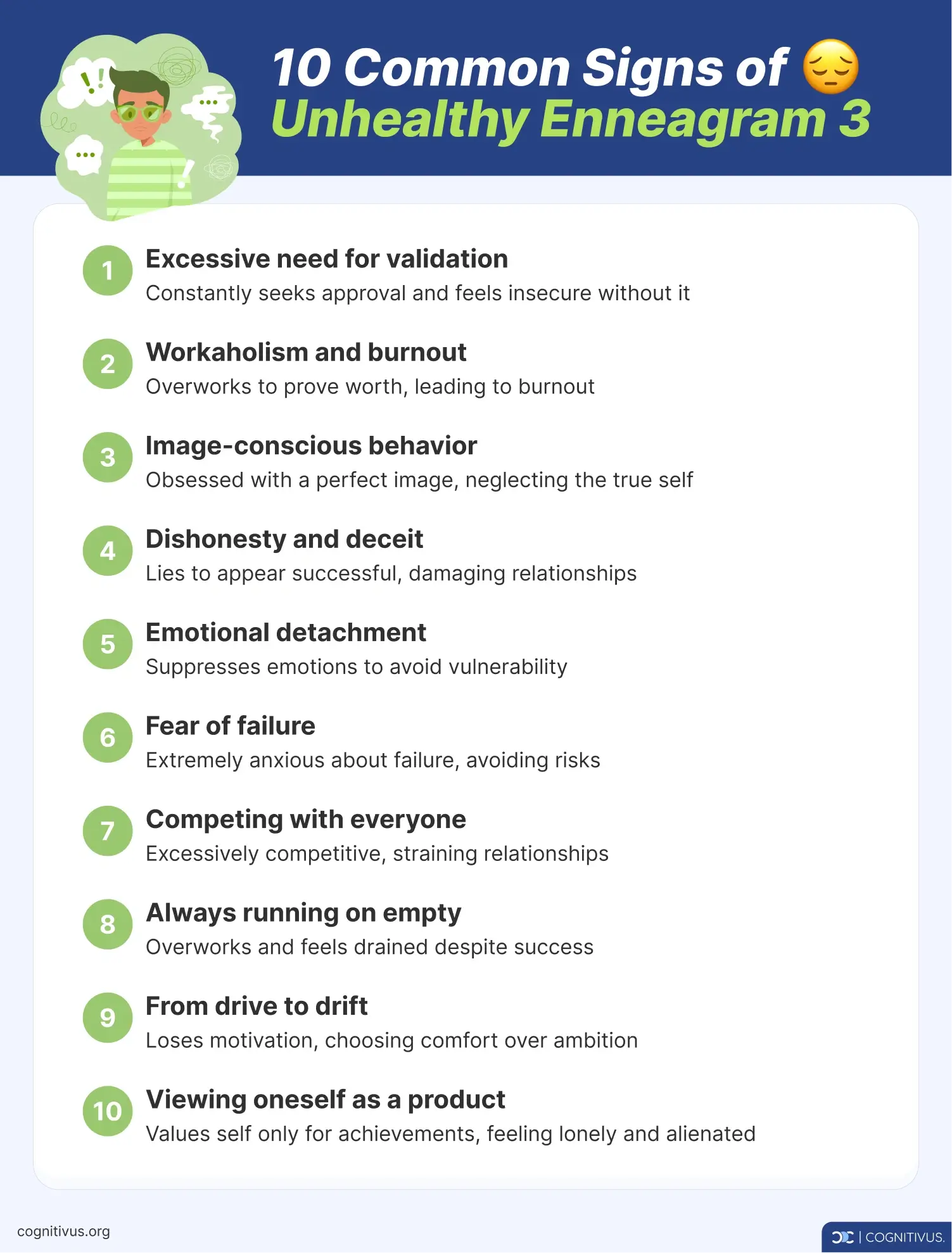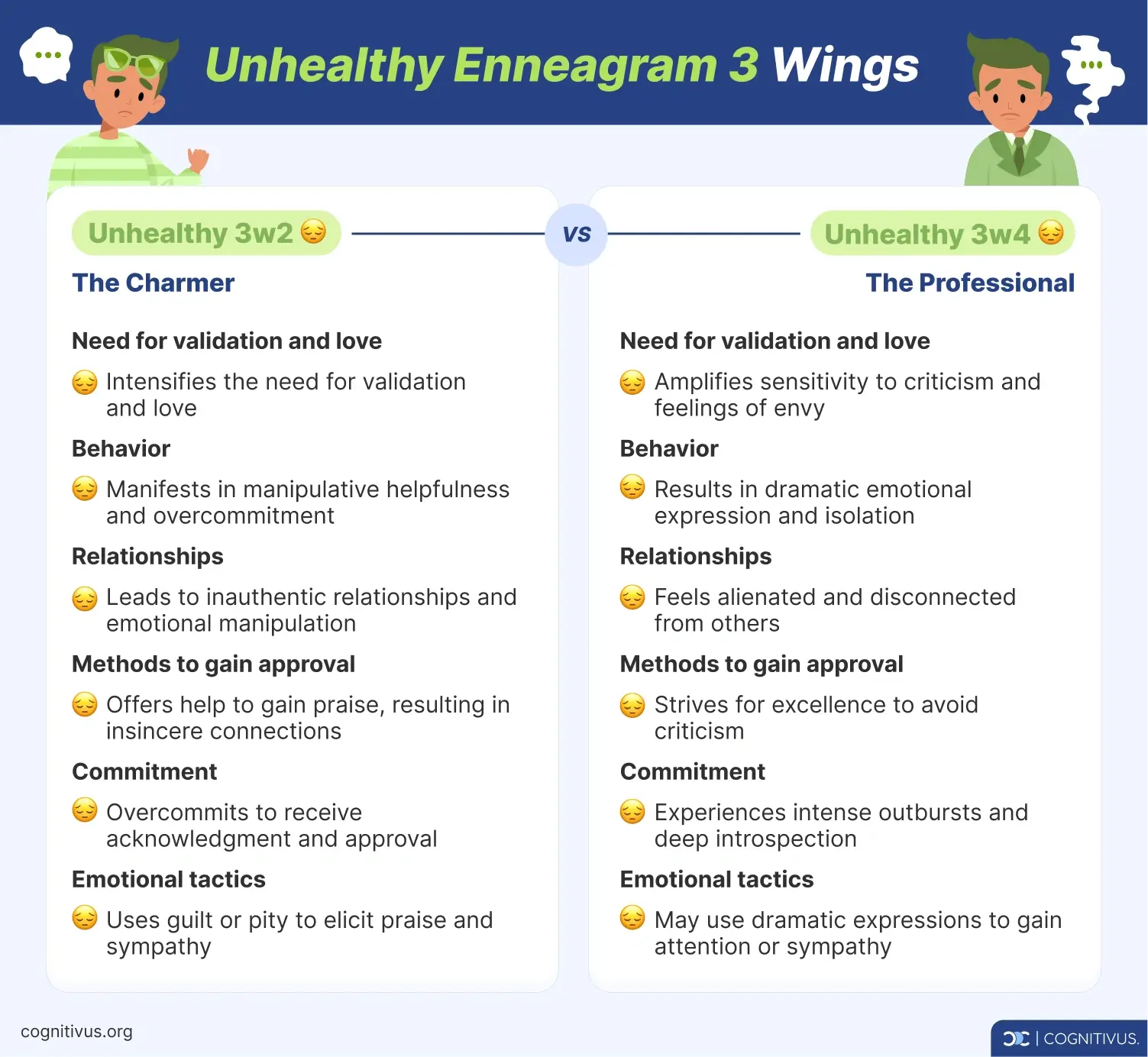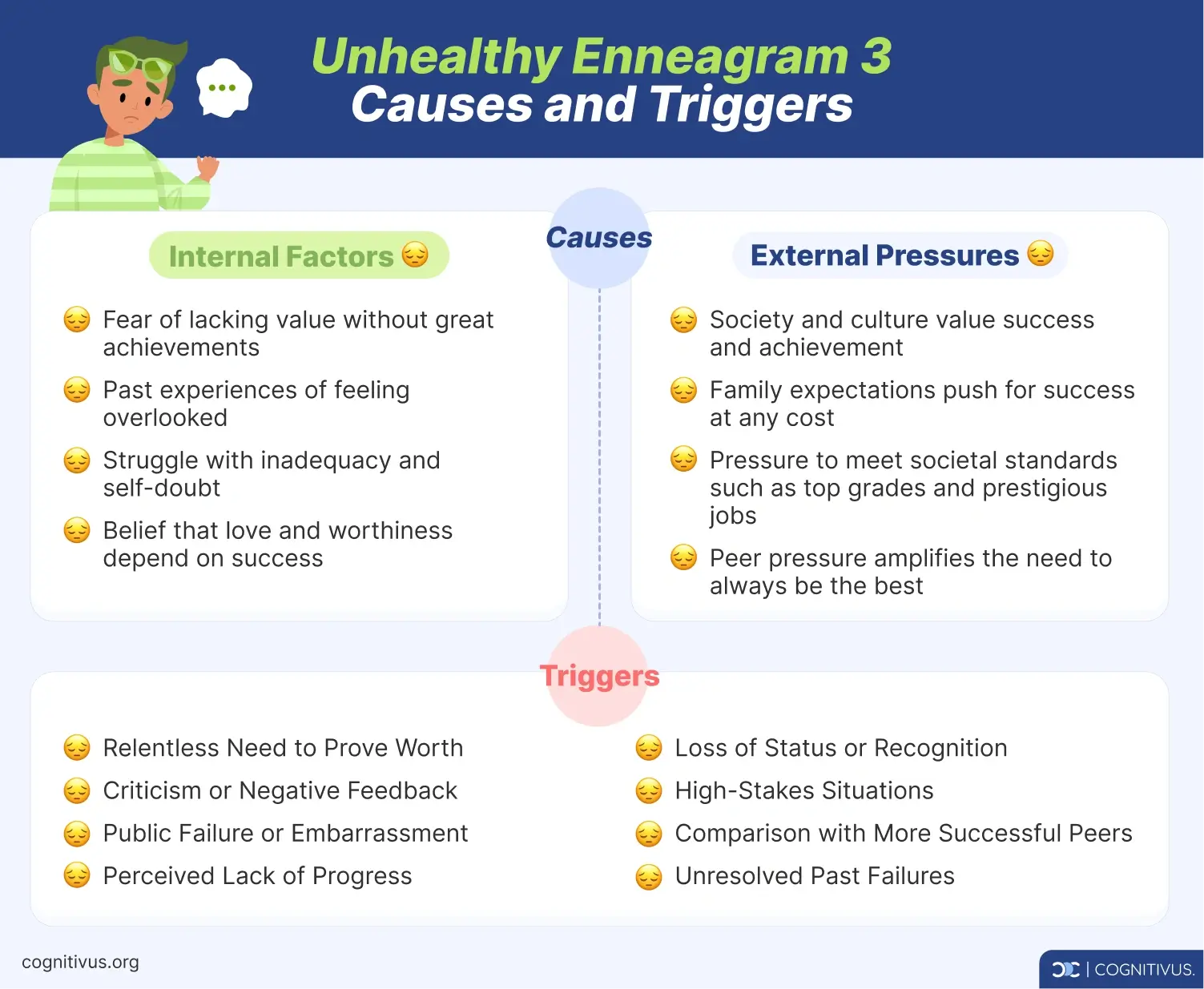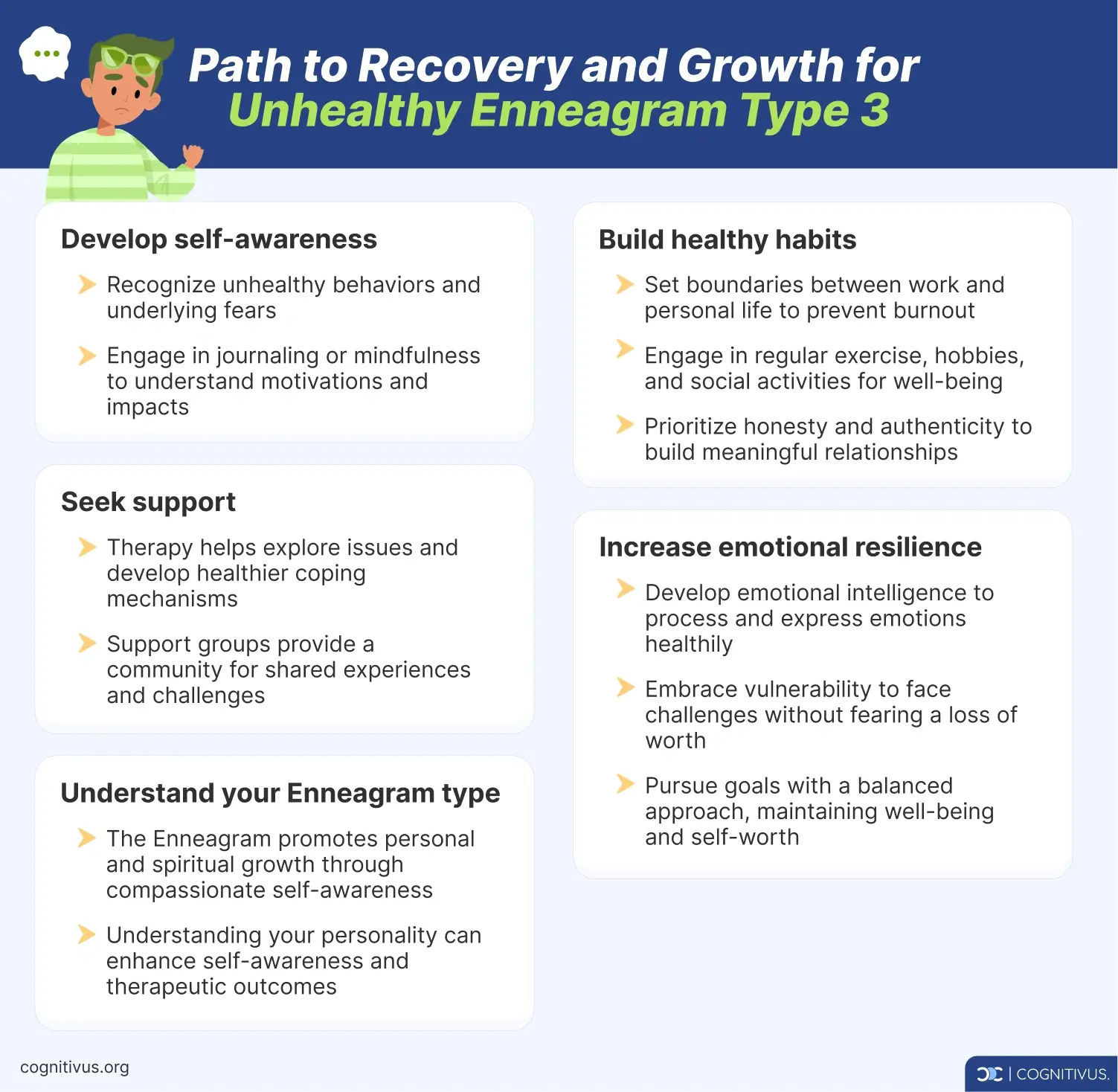If you’re a Type 3 or have one in your life, understanding the complexities of this personality type can help build healthier relationships and support personal growth.
While ambition and determination of Type 3s are remarkable strengths, these traits can sometimes become overwhelming when not balanced with self-awareness. Without balance, a healthy Type 3 can shift into unhealthy or even toxic behaviors.
Today, we will explore the typical signs of an unhealthy Enneagram 3 and their impact on daily life.
Enneagram Type 3: A Quick Overview
Enneagram Type threes, known as "The Achiever" or "The Performer," are driven by a core motivation to feel valuable and worthwhile. They are dynamic, ambitious, and goal-oriented. They thrive on success and recognition.
Core Traits and Motivation of Enneagram Type 3
Type 3s are naturally ambitious, goal-oriented, and dynamic. They focus on achieving success and often measure their self-worth by how others perceive their accomplishments. In a healthy state, they inspire and motivate others, working toward goals that align with their values. They also take on the positive traits of Type 6, becoming more cooperative and reliable, which enhances their teamwork and leadership capabilities.
Biggest Fears of Enneagram Type 3
The primary fear of Type 3s is the fear of failure or being perceived as worthless. This fear drives them to constantly seek validation through external achievements. They worry that if they don't succeed or maintain a positive image, they will lose the approval of others. This deep-seated fear often leads to an intense focus on their public persona and success, making it difficult for them to connect with their authentic selves.
Healthy vs. Unhealthy Type 3
When healthy, Type 3s use their ambition to inspire those around them and pursue meaningful goals.
When Type 3s are not in a good place, their need for success can become all-consuming. They might over-identify with their achievements, leading to manipulative behaviors as they try to maintain their image. Under stress, they may exhibit the less flattering traits of Type 9s, becoming disengaged and apathetic. This behavior can hinder their productivity and sense of self-worth.
Even when they’re not at their best or worst, Type 3s are still ambitious and focused, and may become overly concerned with their image and what others think of them. They may prioritize appearance and success at the expense of their authenticity, striving to meet societal standards and expectations.
Now that we've covered the basics, let's identify the typical signs of an unhealthy Type 3.
10 Common Signs of an Unhealthy Enneagram 3
Here are 10 signs that indicate an Enneagram Type 3 is struggling:

1. Excessive need for validation
An unhealthy Type 3 constantly seeks approval from others. They need to hear praise and compliments to feel good about themselves. Criticism feels like a personal attack, making them defensive and anxious. Imagine living in a world where your self-esteem hinges on what others think of you.
This endless need for validation can lead to a never-ending cycle of stress and insecurity. They might go out of their way to please others, sacrificing their own needs and desires just to hear those affirming words. Over time, this dependence on external validation can erode their sense of self, turning into a stressful cycle where they're always anxious and never truly satisfied.
2. Workaholism and burnout
Unhealthy Type 3s often work themselves to the bone to prove their worth. They take on more than they can handle, ignoring their personal needs and well-being. This relentless drive can lead to burnout, leaving them feeling exhausted and unfulfilled.
Typically they would constantly push themselves to the brink, sacrificing sleep, health, and relationships just to achieve their goals. They're driven by a fear of being seen as lazy or unproductive, equating their worth with their productivity, which ultimately leads to an unsustainable work ethic that ultimately burns them out. This state of perpetual exhaustion doesn’t just impact their physical health—it takes a toll on their mental well-being too.
3. Image-conscious behavior
Imagine feeling like you always have to wear a mask, presenting a perfect version of yourself to the world. That's the reality for unhealthy Type 3s. They care a lot about how others see them, often over who they truly are. They may even manipulate the truth or hide their true feelings to maintain a flawless image. This obsession with image can lead to a disconnection from their authentic self.
They might invest heavily in their appearance, social media presence, and outward signs of success, all while neglecting their inner needs and desires. This constant performance can make it hard to connect with others on a genuine level, leading to a deep sense of loneliness and isolation.
4. Dishonesty and deceit
To keep up appearances, an unhealthy Enneagram Type 3 may resort to dishonesty. They might bend the truth, hide their mistakes, or even exploit others and take advantage of opportunities unethically to look successful. This deceitful behavior can damage their relationships and reputation.
Unhealthy Threes are so afraid of failure that they may resort to lying about their accomplishments. They fear that if people knew the truth, they would be seen as failures. This fear drives them to present a polished, successful façade, even if it means compromising their integrity. Over time, this dishonesty can erode trust in their relationships, leaving them in a lonely place, trapped in a cycle of fear and deceit.
5. Emotional detachment
To avoid showing vulnerability, unhealthy Type 3s often suppress their emotions. They fear that showing weakness will make them less admirable. They worry that their vulnerability will be seen as a weakness, so they put up emotional walls. This detachment can make it hard for them to form genuine, deep connections with others.
As they are afraid to let anyone see beneath the surface, they struggle to express their true feelings, leading to a sense of emotional numbness and isolation. This emotional detachment can lead to a lack of empathy and understanding in their relationships, causing further isolation.
6. Fear of failure
The fear of failure haunts an unhealthy Type 3. They might experience extreme anxiety and stress over the possibility of not succeeding. Their fear casts a shadow over every decision and action they take. To avoid failure, they might play it safe, avoiding risks that could lead to growth.
By playing it safe and avoiding risks, they miss out on growth and learning experiences. This fear-driven behavior can paralyze them, limiting their potential and keeping them trapped in a cycle of mediocrity.
7. Competing with everyone
In their unhealthy state, Type 3s constantly have to outdo everyone around them. They become excessively competitive, always comparing themselves to others. They feel like they can never rest, as there's always someone doing better. This competitiveness strains relationships, turning friends and colleagues into rivals.
As they’re locked in a never-ending competition, they miss out on celebrating their own journey. They’re too focused on the next goal, leaving them isolated and unsatisfied despite their successes. This competitive nature can escalate to malicious actions, where they might betray or sabotage others to triumph, further damaging trust and professional relationships.
8. Always running on empty
Feeling like they can never stop striving takes its toll on unhealthy Type 3 individuals. They often overwork themselves, pushing their limits and ignoring signs of fatigue. They rarely take time to rest or reflect, always driven by the need to achieve more. They might even lose sight of why they started in the first place in order to achieve their goals. It's like running a marathon without knowing where the finish line is.
This constant busyness creates an illusion of productivity but leads to chronic fatigue and burnout. They feel drained and disconnected from their authentic selves, despite their outward success.
9. From drive to drift
Picture a driven, ambitious person suddenly losing all motivation. When unhealthy Type 3s hit rock bottom, they might disintegrate into the behaviors of an unhealthy Enneagram Type 9, becoming apathetic and passive. They retreat from their ambitions, choosing comfort and routine over the pressure to succeed. This shift can be confusing and disheartening, marking a total depletion of their energy and a stark contrast to their usual dynamic selves.
In extreme cases, they might exhibit vindictive and destructive behaviors, becoming obsessive about undermining others' happiness. They may even attempt to ruin anything that reminds them of their own failures, displaying traits aligned with behaviors seen in personality disorders such as Narcissistic Personality Disorder.
10. Viewing yourself as a product
Unhealthy 3s often see themselves as a product, valued only for their achievements. In short, they reduce their identity to their successes. Their life becomes a series of performances, constantly aiming to be marketable and impressive. They struggle to believe that anyone could care for them beyond their accomplishments.
This mindset leads to a cycle of loneliness and alienation, as they question whether people truly like them for who they are or just for what they can do.
Impact of the Wings on an Unhealthy Enneagram Type 3
The wings of an Enneagram Type 3, which are Type 2 (The Helper) and Type 4 (The Individualist), can significantly influence the behaviors of an unhealthy Achiever or Performer, however you call a Type 3.

Unhealthy 3w2: The Helper Wing
When Enneagram Type 3s lean towards Type 2, also called Enneagram type 3w2, their need for love and appreciation can intensify their need for validation. This might manifest in manipulative helpfulness, overcommitment, inauthentic relationships, and emotional manipulation. They may offer help not out of genuine care but as a means to gain praise, leading to inauthentic relationships.
Similarly, they may overcommit themselves, saying yes to every request in hopes of receiving acknowledgment and approval. Their need for validation can also result in emotional manipulation, using guilt or pity to elicit praise and sympathy from others.
Unhealthy 3w4: The Individualist Wing
When Enneagram Type 3s lean towards Type 4, their focus on uniqueness and authenticity can amplify their sensitivity to criticism, feelings of envy and comparison. This heightened sensitivity may manifest in dramatic emotional expression, and feelings of alienation and isolation, such as intense outbursts or periods of deep introspection. They may feel like they don't quite fit in with those around them.
Causes and Triggers
Understanding why an Enneagram 3 becomes unhealthy can help in addressing these issues. Here are some common causes and triggers:

External pressures
In many societies, success and achievement are highly valued, often reinforced through cultural norms and family expectations. Growing up in such an environment can be overwhelming, especially for Enneagram Type 3s pushing them to strive for success at any cost. They feel an unrelenting need to meet societal standards of success, whether it's getting top grades, landing prestigious jobs, or maintaining an enviable lifestyle.
This societal pressure often leads them to adopt a workaholic mentality, neglecting their health and personal life in the pursuit of achievement. Peer pressure further exacerbates this, amplifying the feeling that they must always be the best.
Internal factors
Deep down, unhealthy Type 3s struggle with a profound fear: that they are not valuable unless they achieve something great. This fear can stem from past experiences or traumas, such as being overlooked or undervalued in their formative years. This situation is akin to a child who only received attention or praise when they accomplished something.
Over time, they internalize the belief that love and worthiness are conditional on success. This deep-seated fear drives them to constantly seek validation through their achievements. They struggle with feelings of inadequacy and self-doubt, fearing that if they aren't the best, they are worthless. This internal battle often manifests as a relentless drive to prove their worth to themselves and others.
Impact on personal and professional life
When an Enneagram Type 3 becomes unhealthy, it doesn’t just affect them. It impacts their relationships, work, and overall well-being:
Relationships
Unhealthy Type 3s often face difficulties in building and maintaining genuine relationships. Their overwhelming need to appear successful and polished can create emotional distance between themselves and their loved ones.
Never letting anyone see the real you can create a barrier in your relationships. Friends and family may feel alienated or unable to connect on a deeper level, sensing the superficial nature of interactions dominated by the Type 3's concern for image. This lack of authenticity is likely to result in a sense of loneliness for the Type 3, as they struggle to share their true selves and receive unconditional love and support. The fear of not being loved for who they truly are can further exacerbate their need to maintain a flawless exterior, perpetuating a cycle of emotional isolation and insecurity.
Work and career
In the professional context, unhealthy Type 3s might reach impressive heights, but their achievements often come at a steep personal cost. Their relentless pursuit of success and achievements can lead them to take unethical shortcuts, sacrificing integrity for the sake of their goals. This not only jeopardizes their reputation but also strains their professional relationships.
Colleagues may find it challenging to trust or collaborate with someone who prioritizes personal gain over team success. Moreover, the pressure to continuously outperform can lead to a vicious cycle of stress, reducing overall job satisfaction and potentially leading to job burnout.
In leadership positions, the behavior of unhealthy Type 3s is particularly impactful, as it has far-reaching consequences that impact the entire team and organization. Organizational psychologist Claudia A. Nario’s research shows that while Type 3 leaders are expected to be industrious and adaptable, they can become insensitive and ruthless when unhealthy.
High levels of extraversion and conscientiousness typical of Type 3 leaders may fuel job self-efficacy and achievement. However, when these traits are left unchecked, these traits can result in unethical behavior and inconsistency, damaging trust and credibility.
Mental and physical health
Trying to always look perfect and reach big goals can be really hard on unhealthy Type 3s, significantly affecting their mental and physical health. Chronic stress can show up as anxiety, depression, and physical ailments like headaches, insomnia, and fatigue.
When they don't balance their life with some self-care, burnout becomes a big risk, where they feel completely drained and incapable of continuing at their high pace. This burnout not only diminishes their professional performance but also exacerbates their feelings of inadequacy and failure, further trapping them in a cycle of unhealthy behaviors.
Path to Recovery and Growth
Recognizing the signs of being an unhealthy Type Threes is the first step towards recovery. Here’s how they can move towards a healthier, more balanced life:

Self-awareness and reflection
The journey towards recovery for Type Threes begins with cultivating self-awareness. They need to recognize and acknowledge their unhealthy behaviors and the underlying fears driving them. Engaging in reflective practices such as journaling or mindfulness can help them understand their motivations and the impacts of their actions. This self-reflection allows them to identify patterns and triggers, providing a clearer path to personal growth and healthier behavior.
Exploring your Enneagram type
A research from the University of Florida also underscores the importance of personality typing in therapy. It notes that understanding one's personality can significantly enhance self-awareness and improve therapeutic outcomes.
Supporting this, American research highlights the utility of the Enneagram in promoting personal and spiritual growth. The Enneagram can aid in achieving compassionate self-awareness, which is crucial for personal development. Reflective practices are aligned with the Enneagram's goal of fostering this self-awareness to promote growth.
Seeking support
Therapy or counseling can be a crucial part of the recovery process. A professional can help Type 3s explore the deep-rooted issues that make them crave validation and success. Through therapeutic guidance, they can develop healthier coping mechanisms and build a stronger sense of self-worth that doesn’t solely depend on external achievements.
Support groups can also be super helpful. As these groups offer a community of people who get what they are going through, they can share their experiences and hear from others facing similar challenges. Both therapy and support groups provide a space to see their journey in a new light.
Developing healthy habits
Finding a balanced lifestyle is essential for Type Threes who want to move towards a healthier life. Setting boundaries between work and personal life can help prevent burnout and ensure they make time for self-care and relaxation.
Making time for practices like regular exercise, hobbies, and social activities can be a great way to recharge, enhancing their overall well-being.
Additionally, prioritizing honesty and authenticity in their daily interactions can help them build more meaningful and supportive relationships, allowing you to be yourself and ultimately reducing the pressure to constantly perform and succeed.
Building emotional resilience
Building emotional resilience is key for Type Threes to handle criticism and failure constructively.
Developing emotional intelligence allows them to process and express their emotions hein a healthy way, rather than suppressing them. By learning to embrace vulnerability, they can face challenges without fearing a loss of worth, which in turn learn and grow from their experiences.
Over time, this emotional resilience, which is measured by the adversity quotient, will enable them to pursue their goals with a balanced approach while maintaining their well-being and fostering a healthier sense of self.



